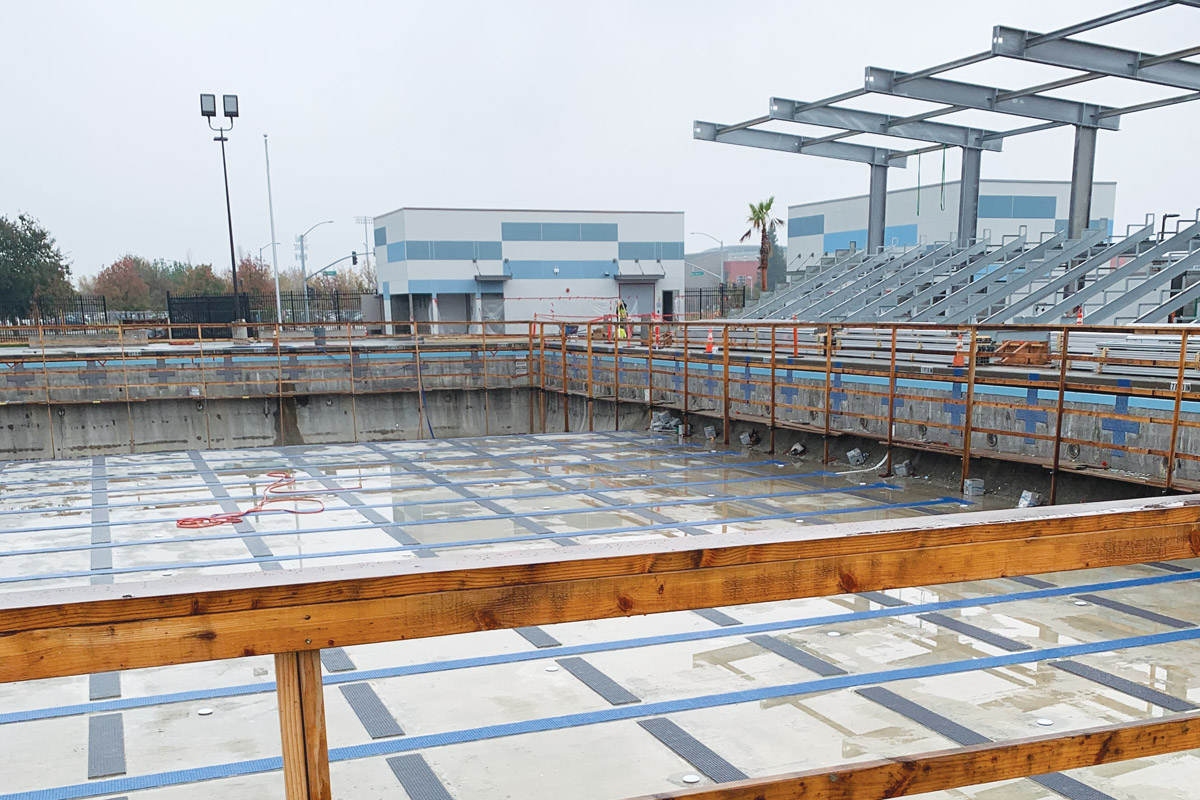Living Large

When it comes to plastering giant pools, Rob Burkett, owner of Burkett’s Pool Plastering and Remodeling Inc. in Ripon, California, knows what it takes to complete a job that’s up to snuff.
“It all comes down to manpower,” Burkett says, “and that’s where a lot of smaller companies run into problems.”
Burkett, who is also the secretary/treasurer for the National Plasterers Council, says inability to haul the amount of equipment and materials needed can be another setback for companies looking to take on large commercial projects. “You need some pretty experienced people,” he says. “There’s probably a lot more knowledge going into a commercial pool than a backyard pool.”
David Cooke, owner of David Cooke Plaster Co. in South Windsor, Connecticut, has been plastering pools for 45 years. He also says having enough hands on deck is key. “You send an ample amount of bodies,” Cooke says. “We have enough guys that we can do this.”
While having a sizable team is crucial, Cooke emphasizes that organizing that team and having a plan to follow will be the determining factor for success. From prepping the pool to making sure each team member understands their responsibilities on the project, any unmanaged details can lead to headaches. “Every job is your reputation,” Cooke says. “Manipulate it and keep it under control.”
Shaun Goldberg, plaster department manager at Burkett’s Pool Plastering and the vice chair for the National Plasterers Council, says companies taking on bigger commercial projects may have the manpower, but pitfalls abound when a company thinks having enough hands is all it takes.
“A lot of times companies that aren’t experienced with [large commercial pools] go in willy-nilly and throw bodies at the situation,” Goldberg says.
Creating a strategy that enables everybody to know exactly what they’re doing and what their teammates are doing provides accountability and, Goldberg says, is crucial to doing the job well.
“Preparation is key,” he says. “Even though I have done these big pools hundreds of times, I still do not sleep much the night before. So many things can happen. You could blow a hose and create a huge mess. You could have equipment problems. Someone could get hurt.”
Goldberg recalls one instance where another subcontractor on the site turned off the water supply to the entire job site while Goldberg’s team was mixing. Goldberg believes errors like this can be avoided by performing pre-site visits, so that everyone at the location is aware that his team will need full access on the plaster day.
Another detail that Goldberg and Burkett say can fall through the cracks is making sure teams are keeping in compliance with state and local regulations.
“You have several people who are watching and overseeing, making sure that you’re doing everything right,” Goldberg explains. “There’s usually a set of specs that you have to follow.” Depending on a company’s location, inspectors could be looking for a number of things, including how materials are disposed of and the types of plaster mixtures used.
Burkett warns that those who don’t do their homework beforehand can end up in over their heads. “There are so many fine points that you’ve got to be aware of,” he says, “or they’ll come around and really bite you.”
Goldberg explains there can also be more paperwork involved, especially with public works jobs. “We’ve seen companies try something that they’re not familiar with, and they end up getting in trouble because they don’t know how to do certified payrolls,” he says. “They don’t know how to do state jobs. There are unions involved as well.” Goldberg recommends companies learn all they can about regulations, paperwork and the consequences of not complying.
One way that Burkett and Goldberg keep track of projects and manage their team is through intensive planning and mapping for each project.
“We can go back to every big commercial pool we’ve done and say, ‘This guy did this lane’ or ‘This guy did that wall,’ ” Burkett explains. “What it does is hold people accountable — it works.”
Cooke says doing the job with integrity and accuracy will save time, money and help customer retention. “It’s all time and material,” he says. “You’re better off having someone calling you 15 or 20 years later saying, ‘Hey, it’s that time again, give us a price.’ They’re not bidding the job out,” he says. “You go give them a price and you redo that pool because they’re happy with what you did the first time.”





